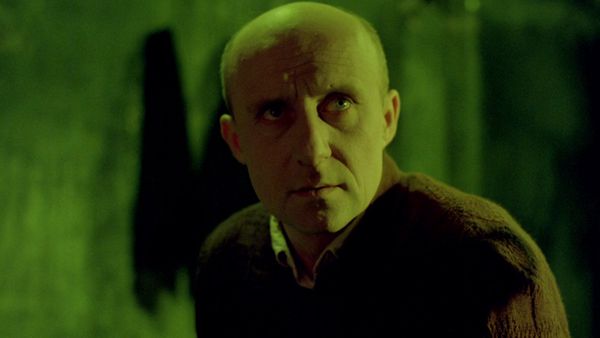Eye For Film >> Movies >> Golem (1980) Film Review
Golem
Reviewed by: Tobiasz Dunin

Through skilful departure from reality and the use of apt allegories, speculative science fiction is the perfect genre for filmmakers working under oppression and censorship. The times of the Polish People's Republic, when Piotr Szulkin began his film career, were not favourable to artistic creativity based on freedom of expression. Despite being persecuted for his anti-socialist views, he managed to stay imaginative and nonconformist – traits that are important for filmmakers regardless of the era or system in which they operate.
His feature debut, loosely inspired by the novel by Austrian author Gustav Meyrink, presents a post-apocalyptic future where scientists strive to engineer a new race of humans using individuals deemed degenerate. Among their creations is Pernat (Marek Walczewski), a seemingly ordinary product of their experiments, who is subjected to constant surveillance as he navigates his daily life – until he decides to defy his overseers. According to Jewish legend, a Golem is made of clay in the shape of a human, but it lacks a soul. Pernat’s soullessness is strongly emphasised at the beginning, in the interrogation scene, in which he is asked “Do you exist?” Perplexed for a split second, he replies: “I work.”

In Szulkin’s movie, artificial beings are created to allow society to continue functioning. These individuals are subjugated, stripped of their desires and needs. However, in the protagonist, these wants, and his individuality begin to awaken. Walczewski delivers a convincing performance as a character who genuinely seems to be the product of a scientific experiment. Pernat is disoriented and doesn’t appear to remember his past. There is a question whether he even has one. As he tries to find his place in a gloomy and bizarre world, he meets various people, including Rozyna (a future star of Polish cinema, Krystyna Janda) and her father, Holtrum (Mariusz Dmochowski). Paradoxically, in comparison to them, he appears to be the closest to a “normal” human being.
Thanks to the excellent use of green and yellow tones as well as dark shots, the visual aspect of the film stands out. Cinematography by Zygmunt Samosiuk capably underlines the atmosphere of terror and powerlessness in the context of an individual confronting a ruthless system. The murky visual layer is complemented with rich symbolism that might require multiple viewings to fully decode Golem. Moreover, its narrative has a tendency to suddenly jump from one place to another, which makes it even more difficult to follow. All this makes the film an engaging, yet slightly confusing, experience.
Awarded for the Best Debut Director at the Polish Film Festival, Szulkin presents an allegory for Poland’s communist experiment, a contemporary reality for him. Golem is far from being an easy-to-watch sci-fi blockbuster meant for casual entertainment. What’s more, although it premiered many years ago, its message still holds some relevance as discussions on issues such as freedom of speech or the meaning of life outside of work continue. The regime might be different, but the struggle between the individual and the system is constant.
Reviewed on: 04 Jan 2025















